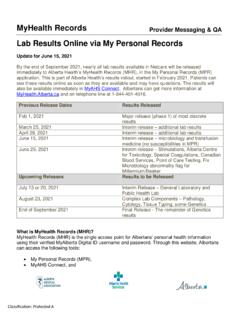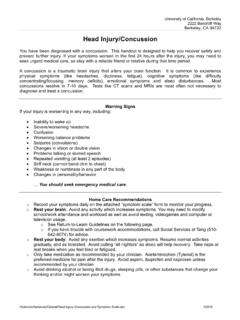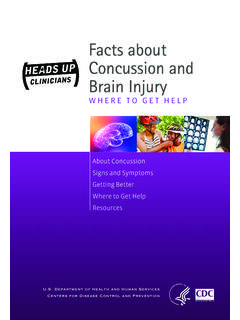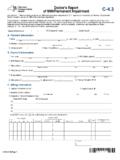Transcription of Concussion/Mild Brain Injury: After Your Visit (Adult ...
1 1/4 Concussion/Mild traumatic Brain injury : After your Visit What is a Concussion/Mild traumatic Brain injury ? A concussion , also called a mild traumatic Brain injury , is a head injury caused by the Brain being shaken around inside the skull After a direct blow to the head, or a sudden jerking of the head or neck when the body is hit. You don't have to pass out (lose consciousness) to have a concussion . Some people will have symptoms of a concussion , such as passing out or forgetting what happened right before the injury , but others won't. Common causes of a Concussion/Mild Brain injury are falls, sports, physical assaults, and motor vehicle collisions. When should I go to the hospital? There is more risk of complications such as bleeding and/or swelling in the Brain in the first 24 to 48 hours After the injury .
2 However, complications can happen even weeks later. Call 9-1-1 or go to the hospital right away for any of these possible life-threatening issues: won t wake up or is hard to wake up become more confused, restless, or agitated become less alert you have the worst headache you ve ever had and a pain medicine (like Tylenol ) isn t helping blood or fluid coming from the nose or ears, or bruising around the eyes or ears loss of vision, blurry vision, or double vision slurred speech or trouble speaking sudden weakness on one side of the body vomit 3 or more times seizure activity (such as abnormal movements, loss of consciousness, loss of bowel or bladder control) If your symptoms get worse at any time or you have new symptoms from the above list, call your doctor or call Health Link at 8-1-1.
3 You can also call Health Link 24/7 if you have questions about Concussion/Mild traumatic Brain injury or any of the information in this handout. Concussion/Mild traumatic Brain injury : After your Visit 2/4 The First 48 Hours Have someone stay with you for the first 24 hours After the concussion . Rest and Sleep Rest for the first 24 hours; it s one of the best things to help your Brain recover. It s okay to sleep if you want. You usually don t have to be woken up every few hours. If your doctor has asked that you are, you should awaken easily and not show any of the warning signs on page 1. Don t do any strenuous activity (like jogging) for at least 24 hours, as it can make your concussion symptoms worse or last longer.
4 Diet Start with clear fluids (such as apple juice or ginger ale) and slowly return to a normal diet. Managing Pain Take acetaminophen (such as Tylenol ) for pain. Talk to your doctor about using products with ASA or NSAIDs in them (such as Aspirin ) or ibuprofen (such as Advil or Motrin ), as they can increase the risk of bleeding. Driving Wait at least 24 hours to drive, even if you think you re okay, as you may have trouble concentrating. Don t drive if you have concerns about your ability to drive. Speak with your family doctor if you have questions about when it s okay to drive. Drinking/Drugs Don t drink alcohol, or take sedatives (medicine that relaxes you) or recreational drugs, as they may make you feel worse and/or hide warning signs.
5 Sports and Leisure Stay away from activities that could cause another head injury (like sports), until the doctor says it s okay. A second blow to the head can cause more damage to the Brain . Rest your Brain Limit reading, television, video games, etc. the first 48 hours. your Brain needs to rest so that it can recover. You may find that it helps to take time off school or work. Stay away from bright lights, loud noises, and crowds for the first 48 hours, as these can make your symptoms worse. For 24/7 nurse advice and general health information call Health Link at 8-1-1. Concussion/Mild traumatic Brain injury : After your Visit The First 4 Weeks 3/4 The First 4 Weeks The symptoms below are common After a mild Brain injury .
6 They usually get better on their own within a few weeks: feeling tired or slow problems falling or staying asleep feeling confused, poor concentration, or slow to answer questions feeling dizzy, poor balance, or poor coordination being sensitive to light being sensitive to sounds ringing in the ears a mild headache, sometimes with nausea and/or vomiting being irritable, having mood swings, or feeling somewhat sad or down See a doctor if your symptoms are affecting your everyday activities. Remember that letting yourself get too tired can make your symptoms worse. What to Do While your Brain is Healing Most everyone recovers from a concussion . The symptoms can take days to weeks to go away.
7 You should start to feel better within a few days and be back to normal within about 4 weeks. If you aren t feeling better within a few days After your injury , see your doctor. your doctor will examine you if you are having trouble managing your symptoms. Rest and Sleep Get enough sleep and rest often enough so that you feel well rested, and rest during the day. Relationships If you re irritable or have mood swings, it can affect your relationship with family and friends. See your doctor if you or your family are worried. Driving Don t drive if you are concerned about your ability to drive safely. Follow-up with your family doctor if you aren t sure that you re medically ready to drive again.
8 Drinking and Drugs Don t drink alcohol or take sedatives (medicine that relaxes you) until your doctor has said it s safe to do so. Don t use recreational drugs. Concussion/Mild traumatic Brain injury : After your Visit The First 4 Weeks 4/4 Work and Study Most people go back to their work or studies within a few days and are back full time in 2 weeks, depending on the type of work you do. Expect to feel tired as you become more active and adjust your rest periods as needed. Some people find it hard to concentrate well so return to your normal activities slowly. Go back to work or school for half days at first, and increase as tolerated. If you feel comfortable doing so, tell work or school about your concussion .
9 You may have to adjust your activities, depending on your job or school demands. Sports and Leisure If you play sports, tell the coach/instructor/or teammates about your concussion . A doctor should be involved in the decision for your return to play. To learn more about returning to play, go to Medicine Use medicine as prescribed. See your doctor if you are still taking pain medicine for a headache longer than 2 weeks After the injury . You may need a different treatment. For 24/7 nurse advice and general health information call Health Link at 8-1-1. This content may be updated without notice. Last Revised: January 14, 2015 Author: Alberta Health Services This material is for information purposes only.
10 It should not be used in place of medical advice, instructions, and/or treatment. If you have questions, speak with your doctor or appropriate healthcare provider. This handout may be printed and distributed without permission for non-profit, education purposes. This content in this handout may not be changed. Contact









